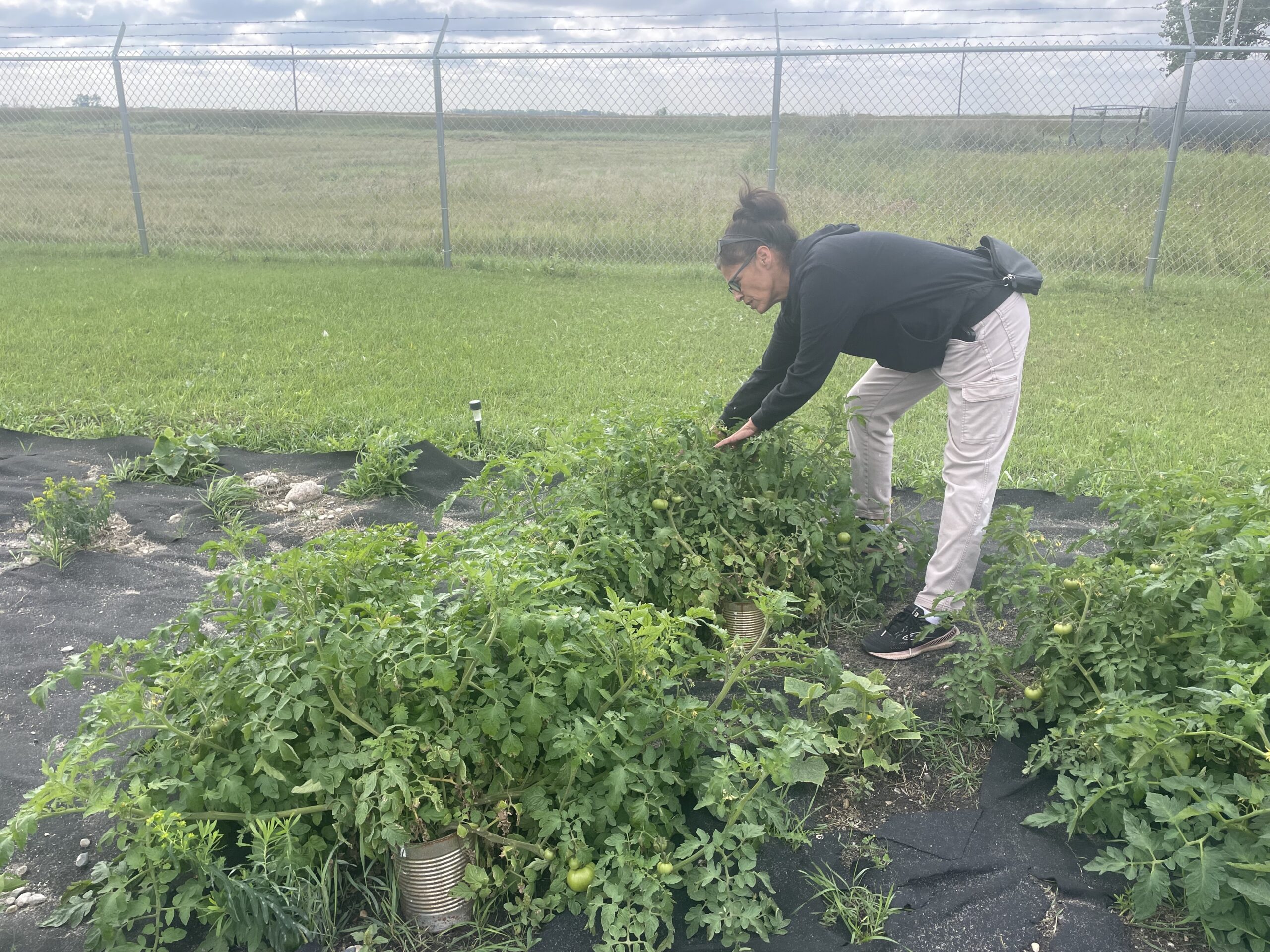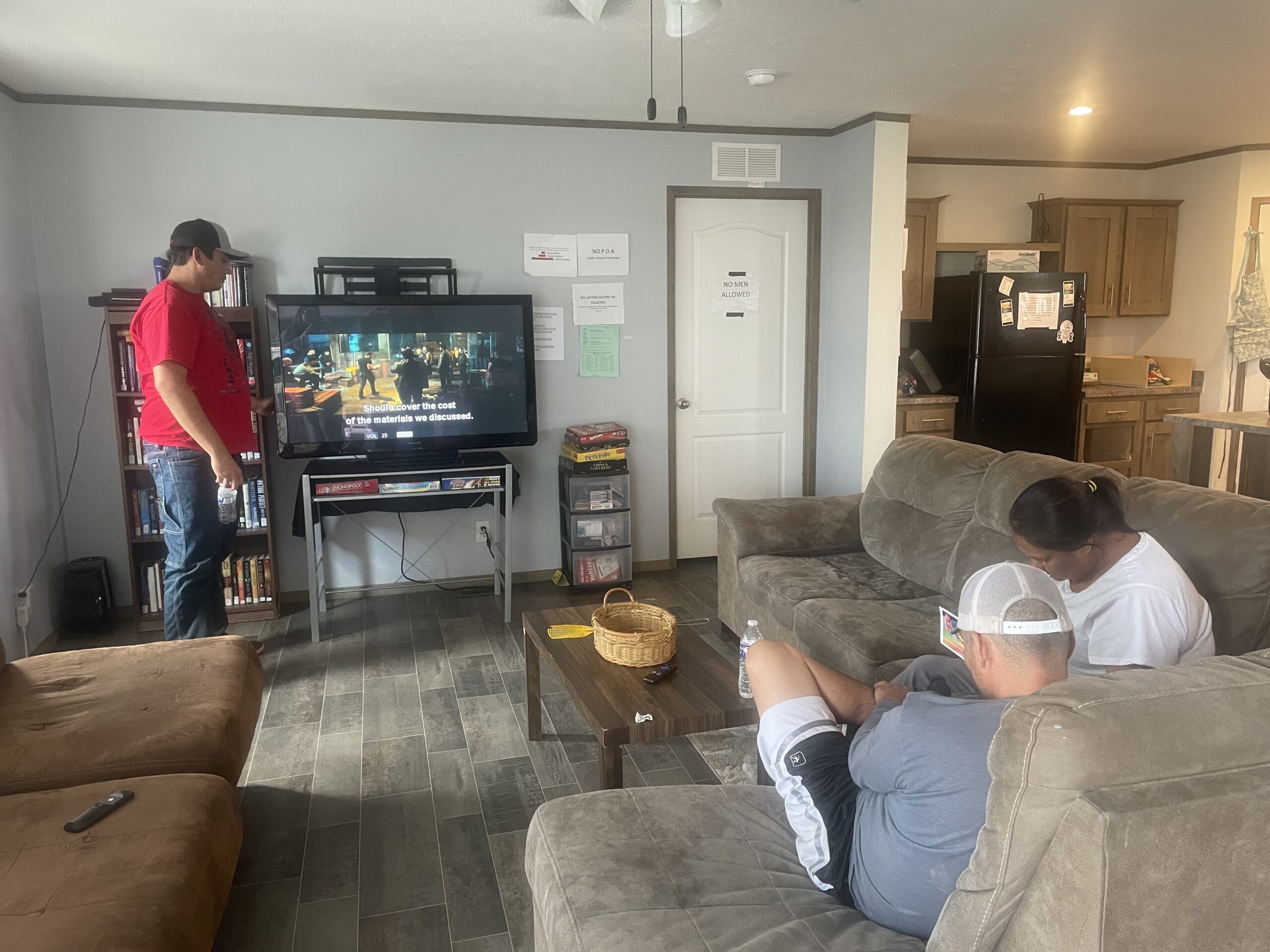The billboard project is expanding to Oregon

One of Natasha Eagleman’s favorite ways to contribute to the shelter is by connecting with her peers while making her mother-in-law’s fry bread recipe. Photo Credit/Adrianna Adame
When Trevor Davis arrived at the Turtle Mountain Mikinaak Ode Shelter, he was battling his inner demons, but two months later, he is now focused and working as a cook at a local diner.
“I came here with nothing really, I didn’t have any clothes or nothing, but alive, I suppose,” Davis said.
Dealing with an addiction, the 24-year-old turned to the shelter looking for help. Last winter, he tried going to treatment but walked away after a week. Davis has steadily been reaching milestones while in recovery and working with staff at the shelter. He now has his driver’s license renewed and received a new social security card so he can work. His next goal: inquire about returning to school to become an electrician.
The Turtle Mountain Mikinaak Ode Shelter is a nonprofit organization that assists homeless individuals, including those hoping to recover from an alcohol or drug addiction. Not wanting to take chances, the shelter attempts to intervene and help at-risk clients as soon as possible before it’s too late. This is its third year in operation in Dunseith, N.D., near the Turtle Mountain Reservation.
The name means Heart of the Turtle, referring to the Anishinaabe creation story about the formation of the landscape. Around 98% of shelter clients are Native American, but Melissa Anderson, the executive director of the shelter, says anyone is accepted. The only rejections are sex offenders or those who likely need medical services.

The shelter was able to pay the workers wages with help from the American Rescue Plan Act. They are depending on foundations, grants, and donations to fund all offered programs once ARPA ends. Some of the staff at Turtle Mountain Mikinaak Ode began digging from their own pockets to cover transportation costs for their clients, according to Co-Executive Director Emil LaRocque.
“We have money to keep going, but not long enough for the long term,” La Rocque said.
Without the money needed to maintain operation costs, the shelter may continue to struggle until it finds another funder to stay afloat. Recently added opportunities for clients, such as a garden, chicken house, cooking, crafting and other cultural workshops, provide clients with a sense of purpose.
“Doing these activities helps them grow, helps them feel, and while they’re sober, it helps them find who they are,” Anderson said.
If the shelter received more money, La Rocque said they’d love to hire a full-time nurse and put more flesh on the bones of their skeleton crew. Anderson also said they would love to expand since they have limited space in the facility. In spite of the lack of funding, many guests at the shelter remain satisfied with their stay.
For the last two months, Natasha Eagleman and her boyfriend have been recovering together. Previously, she heard good things about the shelter in the community. Initially, arriving at Turtle Mountain Mikinaak Ode felt scary, but now says she loves it.
“This place isn’t just for homeless people, but it’s a protective environment and a place where people can get the help that they need.”
Natasha Eagleman, Turtle Mountain Mikinaak Ode Shelter resident
“This place isn’t just for homeless people, but it’s a protective environment and a place where people can get the help that they need,” Eagleman said.
Eagleman says she feels at home in the shelter, and this is what community should feel like. Day after day, clients wake up, eat, talk, complete their chores, and participate in activities together. One of her favorite ways to contribute is by connecting with her peers while making her mother-in-law’s fry bread recipe. Being in an environment where everyone can relate to the various struggles of homelessness and addiction makes her feel less alone.
“I think that’s what people strive for – to feel comfortable somewhere, and everybody here, we’re like one big happy family,” said Eagleman. “You get to know each other personally because a lot of us dealt with addiction and alcohol abuse. We all have our downfalls.”
La Rocque said the shelter saves lives because nearly every client comes in suffering from a problem. According to the co-executive director, homelessness, trauma and addiction run side-by-side.
Beau Marion grew up with instability after the death of his mother in 2005. At first, he began smoking weed, then tried meth at 18-years old, going to jail a few times. At 25-years-old, he began experimenting with heroin and fentanyl, resulting in an overdose. He realized he had a problem and needed treatment. Last month, he went to the shelter. He said he began to feel better after his first three days.
“I was in a dark place,” said Marion. “I was really giving up on life and I’m glad that this place is here because I think that I’d be back on the streets going back to drugs, trying to hide from the pain that I deal with.”

Now, Marion says that his living situation is better. According to the 29-year-old, he is eating healthier, smiling and laughing. For the first time in years, he’s been applying for jobs. While trying to get back on his feet, Marion has been working with mental health professionals to deal with the burden he carries.
Turtle Mountain Mikinaak Ode Shelter staff want clients to move forward with their lives and meet their goals. Moria Parisien, the lead case manager, said she understands where they are coming from, since at one point, she was homeless, couch surfing for years at friend’s places. Parisien, lovingly called “Mama Bear” by the clients, wants people to see the homeless as individuals.
“How you make them heal is to look at them as individuals,” said Parisien. “You don’t look at them as a criminal, you don’t look at them as a poor person, you don’t look at them like they’re hopeless – they’re not. They just need a little help.”
The most rewarding part of Parisien’s job is watching her clients succeed and feeling that after they leave, they’re going to be okay.
“My favorite part is when they get their place, and they walk out with confidence because when they first get in here, their heads are down or they’re mad at the world. When I see them grow, it’s like watching your kid grow,” Parisien said.
After Eagleman and her boyfriend achieve their goal of moving two towns over, she says everyone at the shelter is still going to be family. She wants to come back to visit. When she has the money, eventually, she wants to donate.
Until then, she and fellow clients at the shelter will continue to share meals together while encouraging others to come to the shelter if they ever need the support.
“It’s a good place to go if you don’t want to go to treatment, but you want to help yourself. It’s pretty laid-back. I mean, there are some rules, but that’s a good thing,” Davis said.
Adrianna Adame
Former Indigenous Democracy Reporter
Location: Bismarck, North Dakota
See the journalist page© Buffalo's Fire. All rights reserved.
This article is not included in our Story Share & Care selection.The content may only be reproduced with permission from the Indigenous Media Freedom Alliance. Please see our content sharing guidelines.
Identification not yet made
UTTC International Powwow attendees share their rules for a fun and considerate event
Radio collaboration highlights importance of cooperation in a season of funding cuts for local media
A memorial in the Snow County Prison, now the United Tribes Technical College campus
Standing Rock Sioux Tribal Chairwoman Janet Alkire tells crowd, ‘We’re going to rely on each other’







